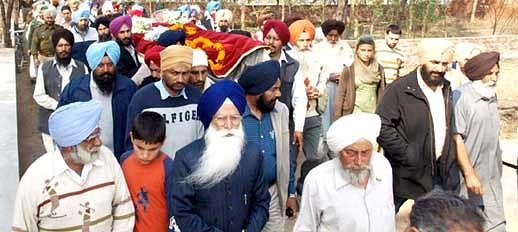
In the sleepy, almost time warped nook in Sangrur, Harinder Singh Mehboob engaged with some of the most complex issues, some of these having to do with matters of life and death and others with problems related to Sikhism. Neither did his mind ever stop functioning, nor did his pen stop writing till the very last breath. Finally, as Mehboob departed from this world in his own village, the debt that he has left for his contemporaries and future generations will be substantial as they wrestle with his legacy and find that works of several lifetimes were accomplished by this great man in just one incarnation.
Mehboob was considered among one of the most learned contemporary writers in Punjab. He was suffering from bone cancer that was detected some time last year and had been undergoing his treatment at Jalandhar. He died on February 15.
With Sehje Rachiyo Khalsa and Jhana Di Raat, Mehboob had shown that he could straddle the world of letters and ideas like a colossus.
“He was a great poet and there were several finer nuances in his poems which have become a treasure for not only the Sikh and Punjabi literature but for the mankind. While evaluation and understanding of his highly intellectual, philosophical and intuitive works would continue those who have delved deep into his works along with what is being written across the world can understand that he can be arraigned among the best contemporary poets in the world,” said Gurtej Singh, Professor of Sikhism, while returning from his cremation at village Jhoonda in district Sangrur.
“There have been very-very few writers who wrote in Punjabi but had encyclopedic knowledge and deepest understanding of intellectual and literary works in other parts of the world also,” he added.
Prominent Punjabi writer Jaswant Deed, himself a Sahitya Akademi Award winner, who had interviewed Mehboob for Doordarshan Jalandhar argued that even the preface of award wining poetry collection by Mehboob – Jhannan Di Raat – was one of the most brilliant pieces on history of Punjabi poetry and should be translated in other languages to make others understand about Punjabi literature. “His is the biggest loss in the contemporary intellectual field,” Deed said. Mehboob was born in that part of Punjab which is today in Pakistan. He studied at Mohindra College, Patiala and later taught at Garhdiwala.
Mehboob was born in that part of Punjab which is today in Pakistan. He studied at Mohindra College, Patiala and later taught at Garhdiwala.
“One could find the references towards original Sanskrit and Arabic literary texts with their depth intact in his works. One could feel the poetic flights even in his work of prose. Extra ordinarily wide perspectives and intellectual depth can be clearly felt when one reads Mehboob,” said Prof Avtar Singh of Sikh Articulators.
Mehboob taught English literature at Khalsa College Garhdiwal but opted to enrich Punjabi. While his first book was Sehje Rachio Khalsa and then came Jhanna Di Raat, for around two decades he was working on an epic about the life of ten Sikh masters – while interweaving the philosophy and history together and expanding the meanings in poetical form.
He had written first and fourth volume of the epic “Illahi Nadar De Pende”, a distinct mark in poetry due to its blending of several finer nuances at a time, he was working on the second volume and had written 100 pages when fell sick.
Even in his hospital bed, he was yearning to complete it. When the World Sikh News last met him at Jalandhar at the ICU, he looked pale and down but not without a sparkle in his eyes as he talked about his epic work.
““I started working on the epic in 1991 when I visited Bhubneshwar and Jagannath Puri to see the temples there. As soon as I am well I will start work on it,” he said. Alas, that was never to be.
“The first thing that came to my mind when I heard of his death was a saying from the holy Koran that says the death of a great scholar is like the passing away of an era,” said renowned Sikhism scholar Ajmer Singh who has actively engaged with Mehboob’s works and is known as someone who perhaps understood his socio-political-religious location better than most. Ajmer Singh said the fact that Mehboob could accomplish all that he did was something the Sikh community should be proud of.
“Perhaps he had an intuition that he would be facing big hurdles in completing his work as in the second volume he added a prayer for accomplishing the uphill task,” said his daughter Prof. Satwant Kaur who looked after him throughout. Satwant teaches Punjabi in Khalsa College Garhdiwala where Mehboob taught English literature.
Scholar Karamjit Singh said in the passing away of Mehboob, the Sikh intellectual world has suffered a huge loss.

